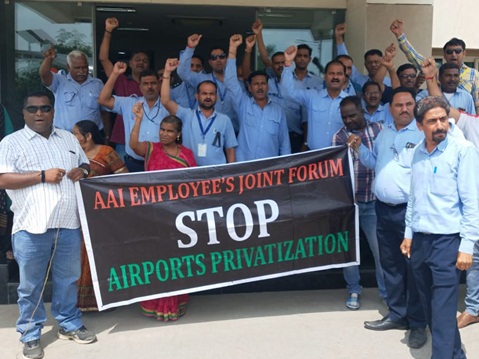TLI Opinion
New Delhi: As central government lines up more airport assets for privatisation, there appears uncanny similarities between airport sector and that of telecom which is headed towards duopoly and public sector companies BSNL and MTNL are crying for cash support to stay afloat.
Foremost among the similarities is private players in both the sectors have gained in reach and profits at the cost of public sector companies. The fate of state-owned Airports Authority of India (AAI) could be no different the way it is being stripped off its profitable assets.
After Adani Enterprises won the bid to manage six airports on offer, AAI Board has proposed to lease out six more airports — Trichy, Bhubaneswar, Raipur, Indore, Varanasi and Amritsar in the next lot.
Sector experts point out growing revenue share by joint venture companies (JVCs) with AAI and per-passenger fee committed by Adani Enterprises Ltd to keep the state agency’s wallet full, but the government mandate requiring PSUs to offer a major chunk of their profits as dividends is unlikely to leave much cash with them.
This will force AAI to look at government for funds for major development works and meet its operational expenses. The employees would be the worst affected as poor financial condition would eventually lead to management coming up with Voluntary Retirement Scheme (VRS). The experience from perennially loss-making state units suggests so.
The other close resemblance between telecom and airport sectors is growing dominance of one or two players with tendency to take advantage of their positions. The regulators are definitely there to ensure fair play but they are yet to establish themselves as completely unbiased and credible institutions.
Bharti Airtel had questioned the role of Telecom Regulatory Authority of India (TRAI) in 2017 alleging that the sector watchdog for “tacitly“ allowing Mukesh Ambani-owned Reliance Jio Infocomm to flout rules around “anti-competitive“ promotional offers. One of the country’s leading business dailies had reported the issue on the basis of an affidavit filed by the telecom company in Telecom Disputes Settlement Appellate Tribunal or TDSAT.
Airports Economic Regulatory Authority of India (AERA)’s order allowing GMR Group-led Delhi International Airport Ltd (DIAL) to raise airport charges by a whopping 346% in 2012 had invited scathing criticism from International Air Transport Association (IATA). The then Chief of global aviation body Tony Tyler had said the decision was unacceptable.
There is one more striking similarity in both telecom and airport sectors. The top players – Adani in the airports sector and Reliance Industries in the telecom space – are seen closer to the political power centres. The two have seen exponential growth in their corporate empires in the last few years and made runaway success in new businesses which are generally fraught with risks.

